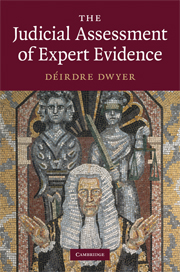Book contents
- Frontmatter
- Contents
- List of figures
- Preface
- Table of legislation
- Table of cases
- Introduction
- 1 General epistemological issues
- 2 Expert evidence as a special case for judicial assessment
- 3 Making sense of expert disagreement
- 4 Non-epistemological factors in determining the role of the expert
- 5 Assessing expert evidence in the English civil courts: the sixteenth to twentieth centuries
- 6 Assessing expert evidence in the English civil courts today
- 7 The effective management of bias
- Conclusion
- Appendix 1 Part 35 of the Civil Procedure Rules 1998
- Appendix 2 Tables of pre-1800 civil cases involving expert evidence
- Bibliography
- Index
- References
Introduction
Published online by Cambridge University Press: 01 July 2009
- Frontmatter
- Contents
- List of figures
- Preface
- Table of legislation
- Table of cases
- Introduction
- 1 General epistemological issues
- 2 Expert evidence as a special case for judicial assessment
- 3 Making sense of expert disagreement
- 4 Non-epistemological factors in determining the role of the expert
- 5 Assessing expert evidence in the English civil courts: the sixteenth to twentieth centuries
- 6 Assessing expert evidence in the English civil courts today
- 7 The effective management of bias
- Conclusion
- Appendix 1 Part 35 of the Civil Procedure Rules 1998
- Appendix 2 Tables of pre-1800 civil cases involving expert evidence
- Bibliography
- Index
- References
Summary
Each age has a predilection for a mode of proof. The Christian Middle Ages had a preference for the ordeal and the oath. The Ancien Régime developed the document and the confession involving torture. Our age has a predilection for expert evidence. Certainly the confession, testimony, the document or the oath continue to be used, but the means of proof which attracts attention, responds to our expectations, and arouses discussion is expert evidence.
The ability of the courts to assess expert evidence is a cause for concern prevalent in western legal systems today. It seems to cut across the traditional divide between Anglo-American and continental European legal systems. The principal form in which that concern is manifest is discussion of expert bias. Bias is of course something that is not unique to experts; it is quite likely that witnesses will be biased, and it is always possible that a judge will be biased. Different legal systems handle these concerns in different ways: some jurisdictions may exclude the testimony of civil parties, criminal defendants or those in certain relationships to them, others may let the question of witness bias go to weight; judicial bias may be dealt with by recusal, or addressed on appeal. The possibility of bias in the testimony of experts is problematic for the courts in a different way from bias in the testimony of witnesses of fact, and it cannot be addressed, as it can for judges, on appeal, and only rarely through recusal.
- Type
- Chapter
- Information
- The Judicial Assessment of Expert Evidence , pp. 1 - 8Publisher: Cambridge University PressPrint publication year: 2008
References
- 4
- Cited by



